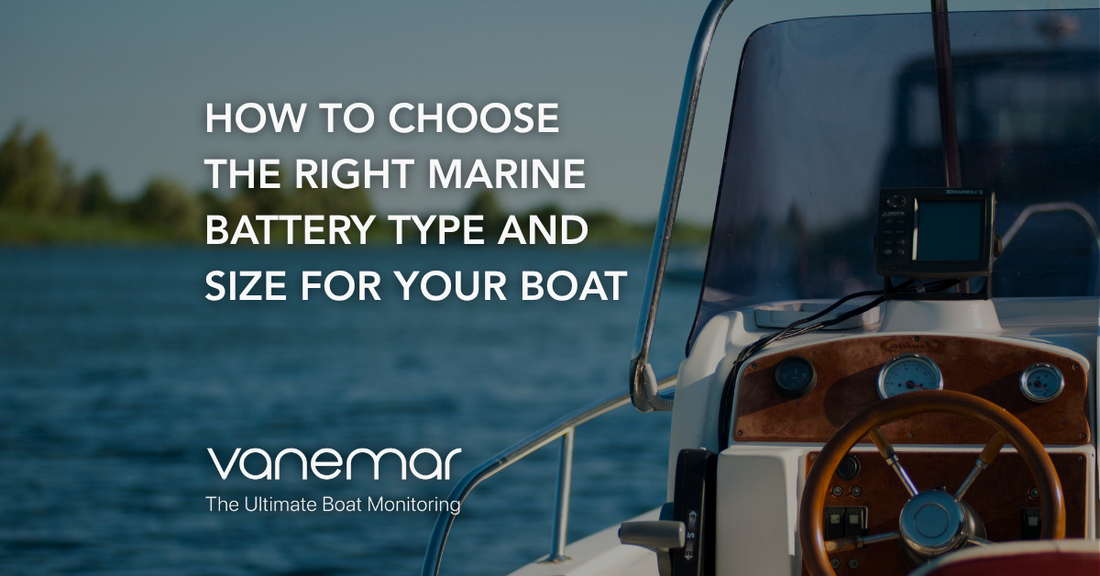
How to Choose the Right Marine Battery Type and Size for Your Boat
Your boat’s battery is a critical component of your vessel’s reliability and safety as well as its power source. Whether you're starting the engine or powering navigation and onboard systems, having the right marine battery ensures peace of mind on every trip.
With so many options available, many boaters find themselves asking:
- What type of battery is best for a boat?
- What should a boat battery voltage be?
This guide will help answer those questions while walking you through how to choose the right marine battery for your needs, based on battery type, size, and performance criteria.
Table of contents
Understanding Marine Battery Types
Not all batteries are built for life on the water. Marine environments demand specific battery designs that can handle starting loads, deep cycling, or both. If you’re unsure what the best battery for a boat is, start by identifying the right type based on your usage:
1. Starting Batteries (Cranking Batteries)
These are built to deliver a powerful surge of energy to start your engine quickly. If you're searching for the best boat starting battery, look for models with high Cold Cranking Amps (CCA) to match your engine’s needs. However, these batteries are not designed to power onboard systems for long periods.
Ideal for: Engine ignition only.
2. Deep Cycle Batteries
Designed for sustained use, deep cycle batteries provide steady power over time, making them suitable for lighting, electronics, trolling motors, and more. They can handle frequent discharging and recharging cycles.
Ideal for: Boats with extended use of onboard systems.
3. Dual-Purpose Batteries
A compromise between starting and deep cycle capabilities, these batteries offer moderate cranking power and discharge tolerance. They're often used on smaller boats or vessels with limited space.
Ideal for: Boat owners needing flexibility with a single battery setup.
Understanding these categories is the first step toward answering: What type of battery is best for a boat based on your usage?
What Should a Boat Battery Voltage Be?
Understanding the right boat battery voltage starts with your vessel’s size and onboard electrical demands. From basic lighting and engine ignition to advanced electronics and auxiliary equipment, every boat has unique power needs. Matching your battery voltage to your setup is essential for ensuring safe, efficient, and reliable performance on the water.
Smaller recreational boats typically rely on 12-volt systems to power essential functions like lighting and engine ignition.
- Larger vessels with more complex setups; such as multiple electronics, inverters, or electric motors, often require 24-volt or even 36-volt configurations to deliver the necessary capacity and performance.
Choosing the correct voltage is crucial. Using the wrong battery configuration can lead to underperformance or even damage to your onboard electronics. Always check your boat's electrical system requirements before installation.
If you want to understand how voltage impacts battery health and performance, read our guide on Why Is The Boat Battery Monitoring System Crucial? .
How to Choose the Right Marine Battery: Key Factors
Beyond battery type, here are the most important specifications to consider when selecting a good boat battery:
Battery Capacity (Ah)
Measured in ampere-hours, capacity indicates how long your battery can power devices before needing a recharge. If your boat has high energy demands, such as GPS, sound systems, or pumps, choose a high-capacity marine battery.
Reserve Capacity (RC)
RC tells you how long the battery can run essential equipment if the charging system fails; crucial during emergencies or when you're anchored for extended periods.
Durability and Build
Marine conditions are harsh. Your battery should be harsh, too. Look for sealed batteries like AGM (Absorbed Glass Mat) or gel batteries that resist vibration, moisture, and corrosion with minimal maintenance.
Size and Fit
The battery’s group size (its physical dimensions and terminal position) must be compatible with your boat’s battery compartment. Always check fit before purchasing.
Tip: Choosing the marine battery best suited for your boat is not only about power it’s also about compatibility and longevity.
Trusted Marine Battery Brands
Still unsure what is the best starting battery for a boat or which brand to trust? Here are a few reputable options:
Optima BlueTop: Spiral-cell technology, known for strong cranking and deep-cycle performance.
Interstate Marine Batteries: Offers a wide range of dependable batteries with a solid track record.
Exide Nautilus Series: Known for value and reliability, especially in dual-purpose models.
- Odyssey Marine Batteries: Premium option for boats with high power needs and fast recharge times.
Before committing, cross-reference brand specs with your boat’s requirements to ensure you choose the best boat battery for your setup.
Keeping Your Boat Battery Healthy
The right battery will serve you well, but only with proper maintenance. Here’s how to protect your investment and maximize its lifespan:
Inspect regularly for terminal corrosion or loose connections.
Charge smart using a marine-grade charger never let the battery run completely flat.
Store correctly during the off-season in a cool, dry place; recharge occasionally to prevent capacity loss.
- Monitor performance using a multimeter or, for remote visibility, pair your system with a Vanemar Battery Sensor for real-time battery health updates via the Vanemar App.
For more in-depth battery health and maintenance tips, see our article Maximizing Battery Life: Tips for Keeping Your Boat’s Battery Healthy .
Choosing the right battery doesn’t need to be complicated. Start by understanding your boat’s power needs, then evaluate battery types, voltage, capacity, and fit. Whether you’re searching for the best boat starting battery or a deep cycle solution for electronics, matching your vessel with the right battery ensures safe, reliable performance every time you set sail.
When paired with smart monitoring tools like the Vanemar Gateway and Vanemar NMEA 2000 Boat Adapter, you can track battery voltage remotely, so you’re never caught off guard by a drained battery.
A good battery makes a reliable boat. And a reliable boat makes for stress-free boating.



